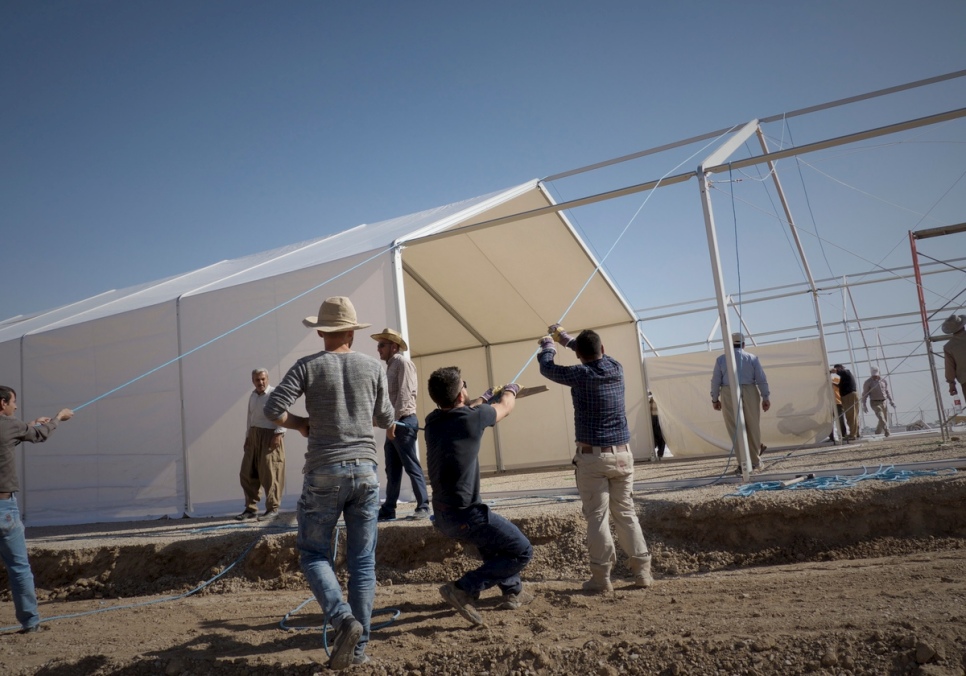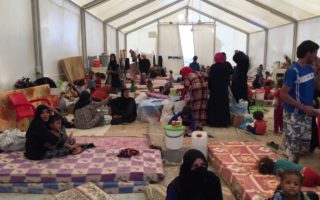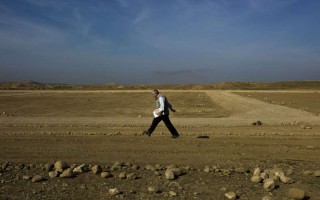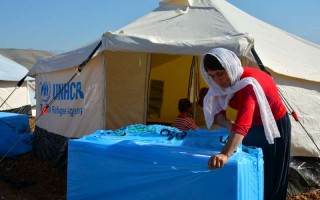
UNHCR, the UN Refugee Agency, has several camps open and ready to shelter those displaced in expected Mosul exodus. © UNHCR/Rasheed Hussein Rasheed
A military operation to retake Iraq’s second city has so far uprooted a few thousand people, allowing the UN Refugee Agency to focus on continued preparations ahead of the expected exodus.
The unfolding Iraqi military assault on Mosul has so far uprooted only a few thousand people, allowing UNHCR, the UN Refugee Agency, to focus on continued preparations for a possible larger-scale displacement in the weeks ahead, a spokesman said today.
A large ground and air operation to retake Iraq’s second largest city, which was home to nearly 2.5 million people before it was taken by militants in June 2014, began earlier this week and could continue for two months, according to Iraqi forces.
So far UN data shows that 3,900 people – or 650 families – have been displaced from Mosul and Al Hamdaniya districts, UNHCR spokesperson Adrian Edwards told a news briefing in Geneva on Friday (October 21).
“These people have been transported to a nearby reception centre in the village of Al-Hood where they are being helped. In addition, 240 people, or around 40 families, were displaced from Makhmur district, east of Mosul, were transferred to a reception centre (Debaga) yesterday,” Edwards said.
In anticipation of large scale displacement from the city – believed to have a current population of around 1.5 million people – UNHCR has in recent weeks established five camps, and is also ready to work in three emergency sites established by other agencies, to provide shelter to 60,000 people. Altogether, 11 camps are planned, including the five already set up, with capacity for 120,000 people.
With full funding and readiness, UNHCR would be able to provide shelter support inside and outside camps for 600,000 people and we are appealing to donors for this additional help. We are in the process now of organizing airlifts for next week for 7,000 family tents to Iraq from warehouses in Dubai and Amman.
Altogether, 11 camps are planned, including the five already set up, with capacity for 120,000 people.
Edwards stressed that with full funding and readiness, UNHCR would be able to provide shelter support inside and outside camps for 600,000 people. He noted that the agency is appealing to donors for this additional help and is currently in the process of organizing airlifts for next week for 7,000 family tents to Iraq from warehouses in Dubai and Amman.
In neighbouring Syria meanwhile, UNHCR and its partners are also finalizing preparations to be able to provide emergency assistance for families fleeing Mosul, Edwards said. Reception capacity is being reinforced at the Al Hol camp to the east of Al Hasakeh.
Currently at Al Hol, UNHCR is providing support to 5,512 Iraqis, 4,600 of whom have arrived since April, and 912 of whom are newly arrived in recent days. Arrangements are being made to shelter 15,000 individuals, although Edwards said UNHCR hopes to make 50,000 places available.
“We are ensuring that when people reach Al Hol we are able to accommodate them and provide them with needed shelter and life-saving assistance,” he told reporters at the Palais des Nations in Geneva. “Further north at Qamishly, we have sufficient food and supplies in place for 50,000 people,” he added.
The UN and its NGO partners are working to ensure that all services are running and that sufficient water, sanitation, health and protection services will be available at Al Hol. UNHCR is also reinforcing its presence in Al Hassakeh governorate with a new field office in Hassakeh City to ensure an effective response.
In a visit to Iraq earlier this week, UN High Commissioner for Refugees Filippo Grandi stressed that UNHCR required US$196.2 million to fund its full Mosul response, which includes both initial preparations and an operation that could last through the chill winter months.
So far, 48 per cent, of the budget requirement has been provided, but there remains “urgent need for further funding to prepare for possible larger-scale displacement,” Edwards said.
“Beyond shelter, UNHCR plans to meet the core relief needs — blankets mattresses, plastic sheeting, kitchen sets, hygiene sets and jerrycans – of the most vulnerable, as well as the winter needs of the vulnerable,“ he said.





